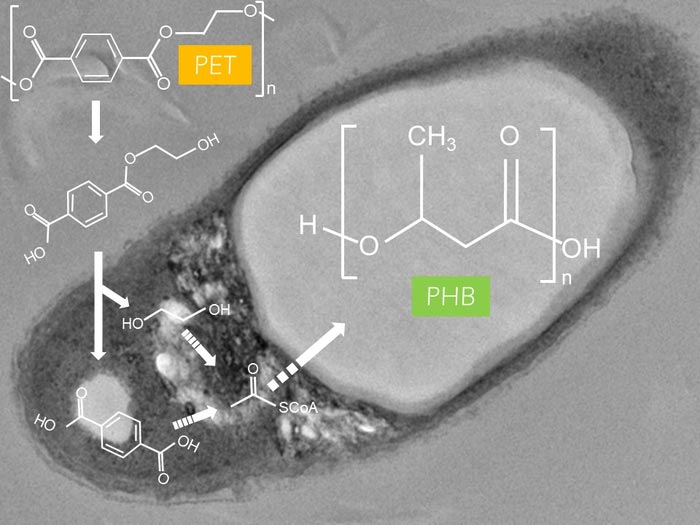How a bacterium may help solve the plastic pollution crisis

I. sakaiensis grown on poly(ethylene terephthalate) (PET) accumulates poly(3-hydroxybutyrate) (PHB).
Credit: Shosuke Yoshida
Researchers from Nara Institute of Science and Technology find that the bacterium Ideonella sakaiensis can not only degrade petroleum-based plastics but can also sustainably produce biodegradable plastics.
Plastic pollution is one of the most pressing environmental issues of our time. The accumulation of petroleum-based plastics is having devastating effects on our environment, wildlife and human health. In a recent study published in Scientific Reports, researchers from Nara Institute of Science and Technology revealed a bacterium that is not only able to degrade difficult-to-recycle petroleum-based plastics but can also sustainably produce more environmentally friendly biodegradable plastics.
Petroleum-based plastics, including poly(ethylene terephthalate) (PET), are extensively used in everyday products, such as single-use plastic bottles, textiles and food wrappers. While such products are disposed of rapidly after use, they persist in the environment for hundreds of years. The plastic pollution resulting from our throw-away culture has now exceeded manageable levels and is overwhelming the planet’s ability to deal with it. The environmental impacts are becoming increasingly obvious, with wildlife and human health increasingly threatened.
Although reducing the manufacture of unnecessary single-use plastics and improving waste management systems will help ease the pollution crisis, our reliance on the convenience of plastic products is unlikely to be abated any time soon. Researchers are therefore looking at alternative approaches to “clean up” the more persistent plastics from our environment and it appears that microbes may offer some promising solutions.
“Certain bacteria harbor the necessary enzymes to degrade PET, the most problematic plastic environmentally,” explains senior author Shosuke Yoshida. “Our research has shown that the bacterium Ideonella sakaiensis converts PET into poly(3-hydroxybutyrate) (PHB), a type of poly(hydroxyalkanoate) (PHA) plastic that is biodegradable,” he continues.
This finding is particularly promising because it addresses two current problems for the sustainability of plastics: degrading the most persistent form of petroleum-based plastic while sustainably producing biodegradable plastics.
“We believe that this discovery could be significant in tackling plastic pollution,” Yoshida states, “as we show that the PET-degradation and PHB-synthesis pathways are functionally linked in I. sakaiensis. This might provide a novel pathway where a single bacterial species breaks down difficult-to-recycle PET plastics and uses the products to make biodegradable PHA plastics.”
Given the overwhelming challenge of dealing with worldwide plastic pollution, this novel bacterial approach may be a significant part of the solution.
Resource
Title: Direct fermentative conversion of poly(ethylene terephthalate) into poly(hydroxyalkanoate) by Ideonella sakaiensis
Authors: Ryoga Fujiwara, Rikako Sanuki, Hiroharu Ajiro, Toshiaki Fukui & Shosuke Yoshida
Journal: Scientific Reports
Information about Yoshida’s lab can be found at the following website: https://bsw3.naist.jp/eng/courses/courses312.html
Journal: Scientific Reports
DOI: 10.1038/s41598-021-99528-x
Article Title: Direct fermentative conversion of poly(ethylene terephthalate) into poly(hydroxyalkanoate) by Ideonella sakaiensis
Media Contact
Takahito Shikano
Nara Institute of Science and Technology
press_contact@rsc.naist.jp
All latest news from the category: Life Sciences and Chemistry
Articles and reports from the Life Sciences and chemistry area deal with applied and basic research into modern biology, chemistry and human medicine.
Valuable information can be found on a range of life sciences fields including bacteriology, biochemistry, bionics, bioinformatics, biophysics, biotechnology, genetics, geobotany, human biology, marine biology, microbiology, molecular biology, cellular biology, zoology, bioinorganic chemistry, microchemistry and environmental chemistry.
Newest articles

Self-Destructing Cancer Cells: Cutting-Edge RNA Breakthrough
Jülich scientists use novel RNA technology to selectively switch off tumours in the brain. An Adaptable Platform Technology That Destroys Glioblastoma Cancer Cells Using a special RNA molecule, a team…

Endurance Training: Transforming Lives of Heart Failure Patients
Can strength and endurance training be beneficial for patients with a certain form of heart failure? A research team from Greifswald investigated this question together with seven other research centers…

A Wake-Up Call for Mediterranean Shark Protection Against Extinction
Overfishing, illegal fishing and increasing marketing of shark meat pose significant threats to the more than 80 species of sharks and rays that inhabit the Mediterranean Sea, according to a…



